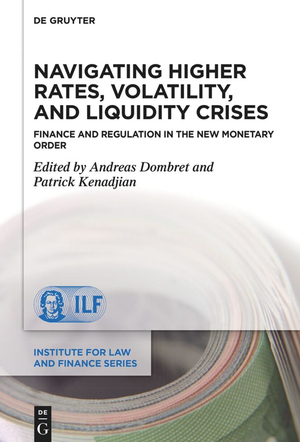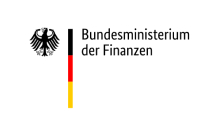Beyond teaching, the ILF also conducts research work in corporate, securities and banking law. The ILF has two foundation professors and two research associates. The ILF research team prepares working papers and issues publications, particularly in the areas of German and international securities and company law, corporate finance, and banking law on a regular basis. In addition, we have in place an ILF Book Series which complies the lectures and presentations made at the various conferences held at the ILF.
The Future of the Financial Sector Book Series

This book is the twelfth in the series on the future of the financial sector sponsored by the Institute for Law and Finance (ILF) at Johann Wolfgang Goethe University in Frankfurt and published by De Gruyter, Berlin. Each book corresponds to a day long conference held by the ILF at which leading representatives from the public sector, industry and academia met to examine key issues of the day concerning the future of the financial sector. Together they trace the arc of our concerns for the sector following the Great Financial Crisis.
The first three volumes, as well as the seventh, concern themselves with the resolution of financial institutions, as well as other potential solutions to the “too big to fail” dilemma in the wake of the crisis, and show the remarkable progress we have made in Germany and in Europe on that topic. The first volume was based on a conference held in November 2010, a point at which the term bank resolution was so unfamiliar in Germany that we felt it best to call the conference “Brauchen wir ein Sonderinsolvenzrecht für Banken?”, do we need a special insolvency law for banks. For the book, which appeared in 2012, we stuck in Too Big to Fail in the title. Contributors included Andreas Dombret, John Douglas, former General Counsel of the Federal Deposit Insurance Corporation, Thomas Huertas, member of the Executive Committee at the UK Financial Services Authority and Alternate Chair of the European Banking Authority (EBA), Martin Hellwig, Director at the Max Planck Institute for Research on Collective Goods and Charles Randell, who was soon to become external member of the UK Prudential Regulation Committee and later Chair of the UK Financial Conduct Authority.
By May 2012 we were already able to discuss what was then being called the EU Crisis Management Directive, although the actual text itself had been delayed and was only published after the conference. By the time the book appeared in 2013 we were able to call it by its definitive name, the Bank Recovery and Resolution Directive, and actually deal with the text itself. It was clear that by then resolution had been adopted by the EU as its preferred solution to too big to fail, although its complexities were still being sorted through, especially the topic of “living wills” and the then very controversial “bail-in tool”. Contributors included Eva Hüpkes, advisor to the Financial Stability Board, Thomas Huertas, Charles Randell and Paul Tucker, Deputy Governor of the Bank of England.
By January 2014 we were considering more radical proposals, as the recommendations of the Liikanen Commission joined the Volcker Rule and the conclusions of the Vickers Commission in the United Kingdom in pointing towards a variety of so-called structural reforms, separating various kinds of banking services. So we asked “Should We Break Up the Banks?” Contributors included Paul Achleitner, Chairman of the Supervisory Board of Deutsche Bank, Jan Krahnen, member of the High level Expert Group on Structural Reforms of the EU Banking Sector and Adam Posen, President of the Peterson Institute for International Economics. At the end of the day, most contributors ended up advocating or conceding that, without a credible bank resolution system, structural proposals to break up the banks would not suffice to solve too big to fail.
We returned to the question of resolution in the spring of 2018 with our program entitled “Resolution in Europe: The Unresolved Questions”, the fourth in our series on too big to fail, in which we narrowed our focus to Europe but broadened our scope to include insurance and central counterparties (CCPs). The book was published in 2019 with contributions by José Manuel Campa, the future Chair of the EBA, Benoît Cœuré, member of the Executive Board of the European Central Bank (ECB), Adam Farkas, Executive Director of the EBA, Levin Holle, Director General, Financial Markets Policy Department, German Federal Ministry of Finance, Felix Hufeld, President of the German Federal Financial Supervisory Authority, Elke König, Chair of the Single Resolution Board, Steven Maijoor, Chair of the European Securities and Markets Authority, Fausto Parente, Executive Director of the European Insurance and Occupational Pensions Authority and Sir Paul Tucker. The contributors concluded that significant progress had been made on bank resolution, although significant open issues remained, especially with respect to cross-border cases, but that less progress had been made on insurance and that CCP resolution required significant additional attention.
In March 2015 we turned our attention from the past to the future to consider the European Capital Markets Union in response to the European Commission’s Green Paper in a session where we questioned whether it was a viable concept and a real goal. The book appeared, in the same year, with contributions from Benoît Cœuré, Sir Jon Cunliffe, Deputy Governor for Financial Stability of the Bank of England, Philipp Hildebrand, Vice Chairman of BlackRock, Anshu Jain, Co-chief Executive Officer of Deutsche Bank and Wim Mijs, Chief Executive Officer of the European Banking Federation. There was a broad consensus on the desirability of the project, but considerable reservations on the tactics being pursued to accomplish it.
In November 2015 – 2015 was a busy year for us – we turned our attention back to one of the nagging questions left over from the Great Financial Crisis: to what extent was the crisis due to culture and could we hope to restore public confidence in financial institutions without tackling the issue of ethics. “Getting the Culture and the Ethics Right, Towards a New Age of Responsibility in Banking” appeared in 2016, with contributions from Lorenzo Bini Smaghi, Chairman of Société Générale, John Cryan, Chief Executive Officer of Deutsche Bank, Georg Fahrenschon, President of the German Savings Banks Association, Douglas Flint, Group Chairman of VIII Preface HSBC Holdings, John Griffith-Jones, Chairman of the UK Financial Conduct Authority, Danièle Nouy, Chair of the Supervisory Board of the ECB Single Supervisory Mechanism, Jean-Claude Trichet, Chairman of the Group of Thirty, Sir Paul Tucker and Axel Weber, Chairman of the Board of UBS Group. There was unanimity among the contributors as to the importance of culture and ethics, but less clarity on whether the goals could best be reached through external pressure from regulation and supervision or bankers’ codes, or internally through boards of directors and structural changes.
We had intended to hold a conference in 2016 on the final Basel III accord, scheduled for finalization by year end. When the negotiations collapsed we pushed our session back to December 2017 and the book, “Basel III: Are We Done Now?” appeared in 2019 with contributions from Claudio Borio, Head of the Monetary and Economics Department, Bank for International Settlements, William Coen, Secretary General of the Basel Committee on Banking Supervision, Andrea Enria, Chairperson of the EBA, Charles Goodhart, Emeritus Professor at the London School of Economics, Levin Holle, Stefan Ingves, Governor of the Swedish Riksbank and Chairman of the Basel Committee for Banking Supervision, Sabine Lautenschläger, Member of the Executive Board of the ECB, Christian Ossig, Chief Executive of the Association of German Banks, Isabel Schnabel, Member of the German Council of Economic Experts and Shunsuke Shirakawa, Vice Commissioner for International Affairs, Financial Services Agency of Japan, The contributors emphasized both the magnitude of the accomplishment Basel III represented and the issues which still remained to be resolved in the implementation of the accord as well as those items about which no agreement had been reached. In 2019 we tackled the questions standing in the way of completing the European Banking Union. The book, entitled “EDIS, NPLs, Sovereign Debt and Safe Assets”, appeared in 2020 with contributions by Andrea Enria, Chair of the Supervisory Board of the ECB, Edouard Fernandez-Bollo, Secretary General, French Prudential Supervision and Resolution Authority, Martin Hellwig, Levin Holle, Dominique Laboureix, Director of Resolution Planning at the Single Resolution Board, Christian Ossig, Fabio Panetta, Senior Deputy Governor of the Bank of Italy, Isabel Schnabel, Joachim Wuermeling, member of the Executive Board of the Deutsche Bundesbank and Jeromin Zettelmeyer, Deputy Director in the Strategy and Policy Review Department at the International Monetary Fund.
In 2021 we opened up our aperture to tackle the global issues concerning climate change, operating for the first time on a fully virtual basis, with an audience of over 1,000 who were treated to an inspiring keynote address by Christine Lagarde, President of the European Central Bank. The resulting book, entitled, “Green Banking and Green Central Banking”, was published to coincide with COP26 in Glasgow in November 2021 with contributions from John Berrigan, Director General in DG FISMA, Günther Bräunig, CEO of KfW, José Manuel Campa, Chairperson of the European Banking Authority, Wiebe Draijer, Chairman of the Managing Board, Rabobank, Christian Edelmann, Managing Partner Europe at Oliver Wyman, Sylvie Goulard, Second Deputy Governor of the Banque de France, Philipp Hildebrand, Vice Chairman of Blackrock, Werner Hoyer, President, EIB, Otmar Issing, President of the Center for Financial Studies, Christine Lagarde, Valentin von Massow, Vice President of the Board of WWF International, Wim Mijs, Chief Executive Officer of the European Banking Federation, Daniel Mminele, former Deputy Governor of the South African Reserve Bank, Ted Moynihan, Managing Partner and Global Head of Industries at Oliver Wyman, Sirpa Pietikäinen, Member of the European Parliament, Deputy General Manager, BIS, Günther Thallinger, Member of the Board of Management of Allianz SE and Jens Weidmann, President, Deutsche Bundesbank.
In 2022 we turned the challenges of data, digitalization, decentralized finance and central bank digital currencies, asking ourselves what each of these might mean for the future of banking and money. This was our second virtual conference and we beat our attendance record from 2021. Over 1,200 participants from 66 countries signed up to hear Agustin Carstens, General Manager of the Bank for International Settlements give the keynote address in which he cogently made the case for central bank digital currencies. The resulting book, entitled “Data, Digitalization, Decentralized Finance and Central Bank Digital Currencies” appeared in 2023 with contributions from Ashley Alder, Chief Executive Officer of the Securities and Futures Commission of Hong Kong, John Berrigan, Director General in DG FISMA of the European Commission, Ulrich Bindseil, Director General, Market Infrastructure and Payments at the European Central Bank, Markus K. Brunnermeier, the Edward S. Sanford Professor in the economics department at Princeton University, Stephen G. Cecchetti, Rosen Family Chair in International Finance at Brandeis University, Barry Eichengreen, the George C. Pardee and Helen N. Pardee Professor of Economics and Professor of Political Science at the University of California, Berkeley, Michael J. Hsu, Acting Comptroller of the Currency of the United States, Stefan Ingves, Governor of Sveriges Riksbank, Bernd Leukert, member of the Deutsche Bank Management Board, Andréa Maechler, member of the Swiss National Bank’s Governing Board, Wim Mijs, Chief Executive Officer of the European Banking Federation, Mu Changchun, Director General of the Digital Currency Institute of the People’s Bank of China and Randal Quarles, former Vice Chairman for Supervision of the Board of Governors of the Federal Reserve System.
In 2023, two months before what came to be known as the “bank turmoil” of March 2023 we asked where the next financial crisis might come from and pondered the question of financial stability in a poly crisis world. The topic was timely, and our speakers were universally excellent, but did not have the gift of prophecy as the consensus was that the regulated banking sector was unlikely to be the source of the next crisis, although we were on target in estimating that the rapid interest rate increases by the central banks might well be the trigger of that crisis. This was our first conference to be held with physical presence since 2020 and was held in a hybrid format. The book, entitled “The Next Systemic Financial Crisis – where might it come from – Financial Stability in a Poly Crisis World”, appeared in January 2024 with contributions from Tobias Adrian, Financial Counsellor and Director of the Monetary and Capital Markets Department of the IMF, Torry Berntsen, CEO, Europe & Americas at Standard Chartered, Claudio Borio, Head of the Monetary and Economic Department at the BIS, Edward Bowles, Global Director of Public Policy at Meta Financial Technologies, Sarah Breeden, Deputy Governor of the Bank of England, José Manuel Campa, Chairperson of the European Banking Authority, Alice Carr, Executive Director for Public Policy at the Glasgow Financial Alliance for Net Zero, Joanna Cound, Managing Director at BlackRock, Stuart Graham, Senior Partner at Autonomous Research LLP, Michael J. Hsu, Acting Comptroller of the Currency of the US, Kerstin af Jochnick, member of the Supervisory Board of the European Central Bank, Klaas Knot President of the DNB and Chair of the Financial Stability Board, Martin Moloney, Secretary General of IOSCO, Luiz Awazu Pereira da Silva, Deputy General Manager of the Bank for International Settlements, Lisa Quest, Market Head for UK&I and European Head of the Public Sector Practice at Oliver Wyman, Cecilia Skingsley, Head of the BIS Innovation Hub, Davide Taliente, Global Chair of Oliver Wyman’s Public Sector and Policy Practice, Axel A. Weber, President of the Centre for Financial Studies at Goethe University Frankfurt, Dominik Weh, Co-head of Oliver Wyman’s Public Sector & Policy practice in Europe and Oliver Wuensch, Partner of Oliver Wyman’s Banking and Sovereign Practice.
The full list of the titles and contributors is set forth below. We are very grateful for all of them for the efforts they put into these volumes, which we hope have contributed to advancing thinking in Europe on the various topics we covered.
Institute for Law and Finance Series; Titles on the Future of the Financial Sector
Authors: Dirk H. Bliesener, Andreas Dombret, John L. Douglas, Martin Hellwig, Thomas F. Huertas, Patrick S. Kenadjian, Wolfgang M. Nardi, Klaus Pannen, Carl Pickerill, Leo Plank, Matthias Raphael Prause, Wolfgang M. Nardi, Charles Randell, Christoph Thole.
Authors: Andreas Cahn, Dirk H. Bliesener, Andreas Dombret, Randall D. Guynn, Thomas F. Huertas, Eva Hüpkes, Patrick S. Kenadjian, Simon Gleeson, Mathias Otto, Charles Randell, Paul Tucker.
Should We Break Up the Banks? Ed. Andreas Dombret and Patrick S. Kenadjian, De Gruyter Recht Berlin (2015)
Authors: Paul Achleitner, Andreas Dombret, Douglas J. Elliott, Simon Gleeson, Randall D. Guynn, Patrick S. Kenadjian, Jan P. Krahnen, Adam S. Posen, Miguel de la Mano, Debra Stone.
A viable concept and a real goal? Ed. Andreas Dombret and Patrick S. Kenadjian, De Gruyter Recht Berlin (2015)
Authors: Cyrus Ardalan, Andrew Bosomworth, Benoît Cœuré, Sir Jon Cunliffe, Andreas Dombret, Alexandra Hachmeister, Philipp Hildebrand, Anshu Jain, Patrick S. Kenadjian, Wim Mijs, Christian Ossig, Dirk Schoenmaker.
Towards a New Age of Responsibility in Banking and Finance, Ed. Patrick S. Kenadjian and Andreas Dombret, De Gruyter Recht, Berlin (2016)
Authors: Lorenzo Bini Smaghi, John Cryan, Andreas Dombret, Georg Fahrenschon, Leonhard H. Fischer, Douglas Flint, Simon Gleeson, John Griffith-Jones, Klaus J. Hopt, Patrick S. Kenadjian, Jan P. Krahnen, Sylvie Matherat, Wim Mijs, Alberto G. Musalem, Danièle Nouy, Dominik Treeck, Jean-Claude Trichet, Sir Paul Tucker, Axel A. Weber.
Authors: Claudio Borio, William Coen, Andreas Dombret, Douglas J. Elliott, Andrea Enria, Michael S. Gibson, C.A.E. Goodhart, Stuart Graham, Paul Hilbers, Levin Holle, Stefan Ingves, Patrick S. Kenadjian, Sabine Lautenschläger, Laurie Mayers, Martin Merlin, Sandie O’Connor, Christian Ossig, Shunsuke Shirakawa, Isabel Schnabel.
Authors: José Manuel Campa, Benoît Cœuré, Andreas Dombret, Wilson Ervin, Joachim Faber, Adam Farkas, Helmut Gründl, Levin Holle, Thomas F. Huertas, Felix Hufeld, Patrick S. Kenadjian, Elke König, Daniel Maguire, Steven Maijoor, Fausto Parente, Giulio Terzariol, Sir Paul Tucker, Mark E. Van Der Weide, James von Moltke.
Authors: Klaus Adam, Roland Boekhout, Thiess Büttner, Rebecca Christie, Andreas Dombret, Colin Ellis, Andrea Enria, Edouard Fernandez-Bollo, Martin Hellwig, Joachim Hennrichs, Georg Huber, Thomas F. Huertas, Patrick S. Kenadjian, Nikki Kersten, Slawek Kozdras, Jan P. Krahnen, Dominique Laboureix, Álvaro Leandro, Nicoletta Mascher, Sylvie Matherat, Wim Mijs, Arthur J. Murton, Charles Nysten, Christian Ossig, Fabio Panetta, Jörg Rocholl, Karl-Peter Schackmann-Fallis, Isabel Schnabel, Anita van den Ende, Nicolas Véron, Klaus Wiedner, Joachim Wuermeling, Jeromin Zettelmeyer.
Authors: John Berrigan, Jean Boivin, Guenther Braeunig, Jose Manuel Campa, Andreas Dombret, Wiebe Draijer, Christian Edelmann, Ed Fishwick, Sylvie Goulard, Philipp Hildebrand, Werner Hoyer, Otmar Issing, Patrick Kenadjian, Mathias Kopp, Christine Lagarde, Valentin von Massov, Wim Mijs, Daniel Mminele, Ted Moynihan, Simona Paravani-Mellinghoff, Luiz Awazu Pereira da Silva, Sirpa Pietikainen, Christian Sewing, Jessica Tan, Guenther Thallinger, Bouke de Vries, Jens Weidmann.
Authors: Ashley Ian Alder, John Berrigan, Ulrich Bindseil Markus K. Brunnermeier, Agustin Carstens, Stephen G. Cecchetti, Andreas Dombret, Christian Edelmann, Barry Eichengreen, Michael J. Hsu, Stefan Ingves, Patrick Kenadjian, Jean-Pierre Landau, Bernd Leukert, Andréa M. Machler, Steven Maijoor, Wim Mijs, Ted Moynihan, Mu Changchun, Randal K. Quarles, Kermit L. Schoenholz, Oliver Wuensch.
Authors: Tobias Adrian, Torry Berntsen, Claudio Borio, Edward Bowles, Sarah Breeden, José Manuel Campa, Alice Carr, Joanna Cound, Andreas Dombret, Stuart Graham, Michael J. Hsu, Kerstin af Jochnick, Patrick Kenadjian, Klaas Knot, Martin Moloney, Luiz Awazu Pereira da Silva, Lisa Quest, Cecilia Skingsley, Davide Taliente, Axel A. Weber, Dominik Weh, Oliver Wuensch.







































